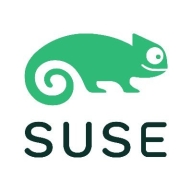

SUSE Linux Enterprise and Google Chrome Enterprise compete in providing robust environments for enterprises. SUSE leads in stability and features for enterprise workloads, while Chrome Enterprise offers cost-effective solutions with strong security and ease of management.
Features: SUSE Linux Enterprise supports Oracle and SAP HANA, providing a secure, scalable environment with its YaST management tool. It also offers high availability features, making it reliable for production environments. Google Chrome Enterprise is valued for its strong security, ease of deployment, and browser-based applications that boost productivity, especially across various devices.
Room for Improvement: SUSE Linux Enterprise struggles with complex package management and user documentation, as well as a steep learning curve for new users. Google Chrome Enterprise, despite its robustness, faces challenges with RAM consumption and limited traditional software application support, with users seeking reduced update frequency and expanded third-party integrations.
Ease of Deployment and Customer Service: SUSE Linux Enterprise offers diverse deployment strategies, including on-premises and hybrid cloud, catering to complex infrastructures with appreciated technical support. Google Chrome Enterprise excels with simple cloud-focused deployment, benefiting from a vast support ecosystem, yet some users find gaps in real-time support, relying on community forums.
Pricing and ROI: SUSE Linux Enterprise's pricing is high due to its premium support and enterprise features, with justified ROI through enhanced performance and stability. Google Chrome Enterprise is more cost-effective with competitive pricing models favored by educational and non-profit sectors, offering affordability and minimalistic licensing for budget-focused organizations.
I have seen a return on investment by switching our clusters from on-prem to Azure public cloud, using our same Bring Your Own Licenses, which saved costs on licensing.
The online support often redirects us to FAQs instead of connecting to a real person.
There could be more detailed guidance on new installations like Google Authenticator, as the process is often vague and lacks fine-tuned information.
There are features regarding QR code setup, compatibility, and security.
SUSE Linux Enterprise provides a stable, secure, and well-supported platform for enterprise workloads, with powerful management tools and robust support for clustering, cloud, and containers.
The customer support is good; whenever we have opened a case, they have provided detailed explanations of the issues and resolutions.
I rate the customer service 10 out of 10 because SUSE has 24/7 availability support, extended support, security, multi-Linux distribution support, upgradation, and everything is user-friendly.
Firefox is slightly more efficient as it uses less memory.
I would just need to move the container I have set up on Cloud Run to a VM or cluster, which could be straightforward.
Its scalability is quite good since we are using Azure, which allows us to easily scale up or down our resources as needed.
SUSE Linux Enterprise is widely recognized for its strong scalability, making it suitable for organizations of all sizes, from small businesses to global enterprises.
I consider Google Chrome Enterprise to be both stable and scalable.
Google Chrome Enterprise is stable, and I haven't faced any stability problems.
When HANA is utilized by many applications, I notice that while utilization does increase, we have never faced lagging or server unresponsiveness.
I would rate stability for SUSE Linux Enterprise an eight out of ten.
If we have a laptop with basic configuration, it eats up a lot of RAM and slows down the system.
This causes hesitation in installing them due to concerns about hidden costs and inadequate information.
Regarding Google Chrome Enterprise improvements, they need to declare some security details; they are applying security but not publishing the details about the security applied.
Security is a top concern, and further strengthening default security policies, simplifying compliance management, and integrating advanced vulnerability management tools would be a valuable improvement.
The software manager was different, making it challenging to install certain applications.
The license we subscribed to should carry over within the same instance family.
It's a bit on the higher side, but we prefer to stick with it because of the security, ease of maintenance, and the company's reputation.
The interface is optimized in terms of the UI and user experience.
Upgrading an instance results in overlapping or double subscription fees.
I would rate pricing for SUSE Linux Enterprise considering one is a high price and ten is a low price.
The licensing cost is a bit high.
The best aspects of Google Chrome Enterprise are its compatibility with everything, smooth management, and frequent security patching, which I find nice to use.
The security it offers is an advantage, which is crucial for us due to HIPAA compliance concerns.
Google Chrome Enterprise is my preferred browser over Firefox and Microsoft Edge.
SUSE Linux had a clean user interface, which was a valuable feature for me.
It has a stable and reliable OS.
The LVM is very easy to configure, along with simple disk scanning compared to other systems.
| Product | Market Share (%) |
|---|---|
| SUSE Linux Enterprise | 5.4% |
| Google Chrome Enterprise | 0.6% |
| Other | 94.0% |


| Company Size | Count |
|---|---|
| Small Business | 8 |
| Midsize Enterprise | 4 |
| Large Enterprise | 13 |
| Company Size | Count |
|---|---|
| Small Business | 8 |
| Midsize Enterprise | 11 |
| Large Enterprise | 22 |
Google Chrome Enterprise combines Chrome OS and Chrome Browser to enable work in the cloud. Manage users’ access to data, applications, and extensions without breaking a sweat. Work securely from anywhere, on any device. Your data is kept safe in the cloud.
SUSE Linux Enterprise offers features like YaST for server management, seamless integration with Oracle and SAP, and a robust security setup. Renowned for stability, it efficiently supports workstations, SAP workloads, and cloud migrations across diverse industries.
SUSE Linux Enterprise is known for its lightweight design, high performance, and ease of installation. Its flexible architecture supports extensive documentation and efficient patching. The system uses the BTRFS file system for effective virtualization, and community support is significant. However, challenges include package updates causing conflicts, difficult initial setup and software management, high pricing, and support response times. Improvements in security compliance, cloud integration, hardware compatibility, and documentation are also needed.
What are SUSE Linux Enterprise's important features?
What benefits should users expect from using SUSE Linux Enterprise?
Industries like healthcare and banking use SUSE Linux Enterprise for secure transactions and structured application deployment. It is also a choice for organizations involved in testing, automation, and web development, offering support for SAP HANA integration and facilitating cloud migrations.
We monitor all Operating Systems (OS) for Business reviews to prevent fraudulent reviews and keep review quality high. We do not post reviews by company employees or direct competitors. We validate each review for authenticity via cross-reference with LinkedIn, and personal follow-up with the reviewer when necessary.